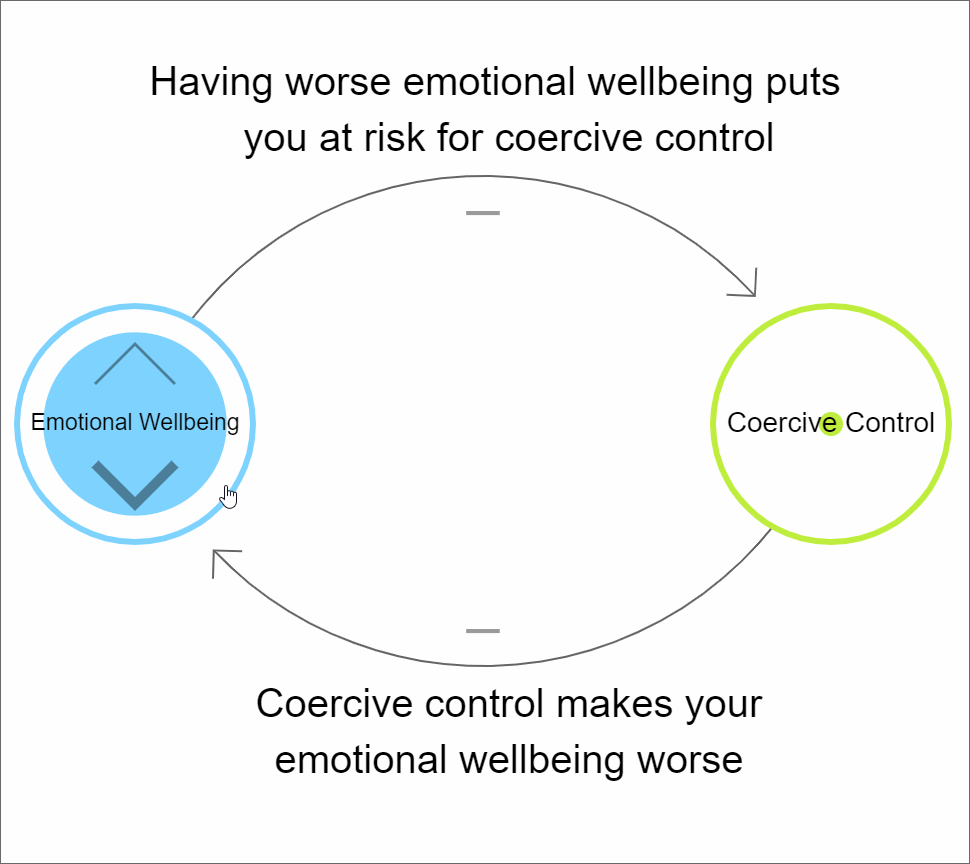The relationship between coercive control and mental health
Domestic abuse charities and campaigners have long highlighted the emotional impact of domestic abuse - and in particular the impact of coercive and controlling behaviours. We've seen the results of these hard years of campaigning and raising public awareness in Parliament testimonies, mainstream media, and ultimately in law and have more understanding now more than ever, of the devastating effects it can have on victims’ mental health. The ongoing Early Action Systems Change partnership work between Dartington, Renfrewshire Council, Engage Renfrewshire, Renfrewshire Health and Social Care Partnership and a range of voluntary services, has highlighted coercive control in relationships can start before adulthood, and that this experience might prevent victims from accessing mental health support.
Understanding coercive control
Women’s Aid describes coercive control as:
an act or a pattern of acts of assault, threats, humiliation and intimidation or other abuse that is used to harm, punish, or frighten their victim.
Relationships such as this are not confined to couples but exist within families and friendships too. Long-term exposure to coercive control is said to erode the victim’s sense of self, confidence and self-esteem[i]. In fact, it is so significant for psychological and emotional wellbeing, that Scotland introduced the Domestic Abuse (Scotland) Act in 2018 – with England and Wales amending the Domestic Abuse Acts shortly after - to make coercive controlling behaviour a criminal offence. This is important but cannot address how we prevent such crimes occurring in the first place.
This is the question we’ve been trying to answer in our partnership with across the public and voluntary sector involving local communities in Renfrewshire.
Introducing our work in Renfrewshire
We began our work originally exploring children’s wellbeing across the region, to understand where and how the Children’s Services Partnership Plan needed to act. Of the 10,000 children and young people who took part, one in ten met the threshold for a likely clinical diagnosis of anxiety and depression, with a further one in four of the 3,058 young people in secondary school who had been in a relationship reporting concerning levels of coercive control within their relationships. The funding from the Early Action System Change allowed us to investigate further.
As you would expect, the evidence showed controlling relationships have an adverse impact on mental health[ii], and poor mental health and emotional wellbeing acted as a risk factor for being a victim of coercive control[iii]. In other words, they are mutually reinforcing.
Having poorer emotional wellbeing puts you at risk for coercive control, but coercive control also increases poor emotional wellbeing. They are reinforcing.
Beyond trapping you in a single relationship, this reinforcing structure means past controlling relationships make you more vulnerable to them in the future. This pattern of behaviour, echoed by the evidence, is why you may see cases of repeated victimisation.
Getting the insights from adolescents
The partnership has been working with young people and families to further understand the impact of coercive control on their emotional wellbeing as well as their experiences of services that should help. Our findings showed that coercively controlling behaviour and its consequences for emotional wellbeing were experienced by adolescents as young as 14.
In one workshop, a young person articulated the toll that a controlling relationship had on their mental health:
“By the time I had gone through the stuff with [my boyfriend] I didn’t want help, I wanted to forget.”
This reinforces how coercive control can generate its own barrier to seeking mental health support both during and after a coercively controlling relationship, potentially “trapping” you in the cycle of repeated victimisation.
In another workshop, there was further evidence of the reinforcing loop, with young people expressing it was difficult to leave controlling relationships once feelings of powerlessness set in.
What became clear across the consultations with more than 500 families and young people, was that young people themselves expressed normalised attitudes to controlling relationship. The following quotes from just two of the young people we spoke to capture the view of many contributors to our consultation: some said “that’s just how relationships go”; and “that’s what everyone is like” . This normalisation is a barrier to affected young people seeking help. This was expressed in the way young people talked about their fear of repercussions – be that from their friends, families, partners or statutory services such as the police and social work. Such examples came out in the language used in the workshops, where young people had been worried their relationship troubles would be dismissed by adults as “teenage drama” (see page 22 of the report) and that poor mental health and wellbeing would label them as “attention seekers” (see page 24 of the report).
What does this mean for services?
The experience of young people suggests that practitioners in these spaces need to be alert to the relationship between coercive control and poor mental health - and how this plays out within adolescent relationships. In addition to this, practitioners should be mindful of how the intersection of poor mental health and coercive control can be a barrier to seeking help.
A public health approach is called for. That is, community-wide efforts to combat the dual stigma of coercive control and poor mental health; guidance for young people, parents and practitioners on how to identify and provide support for someone experiencing coercive control early; and services working together to holistically support the needs of young people, including to maintain strong emotional wellbeing and healthy relationships.
Through this work in Renfrewshire, we not only hope to work in partnership to provide some of this better support for young people around coercive control and emotional wellbeing, but to contribute to the growing body of evidence around how these two issues impact young people globally.
To see more of our findings, read the report below:
[i] Richards, L. (n.d.) ‘So, what exactly is coercive control?’ [website] https://www.laurarichards.co.uk/coercive-control/
[ii] Barter, C.,McCarry, M., Berridge, D. and Evans, K. (2009) Partner exploitation and violence in teenage intimate relationships. London: NSPCC. https://library.nspcc.org.uk/HeritageScripts/Hapi.dll/search2?searchTerm0=C1739
[iii] Vagi, K. J. et al. (2014) ‘Beyond Correlates: A Review of Risk and Protective Factors for Adolescent Dating Violence Perpetration’ Journal of Youth and Adolescence. 42(4): 633- 649.
https://link.springer.com/article/10.1007/s10964-013-9907-7

